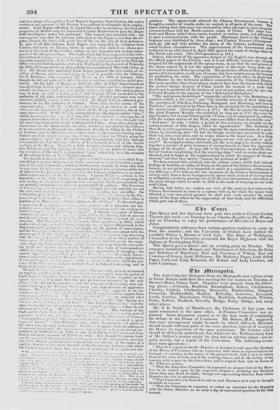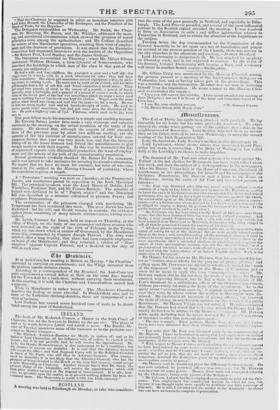he itletropolis.
The Anti-Corn-law Delegates from the Metropolis and various townS in Great Britain held their first meeting for the season on Tuesday, at Brown's Hotel, Palace Yard. Deputies were present from the follow- ing places— i\ rbrouth, Bradford, Birmingham, Bolton, Cleckheaton, Chorley, Carlisle, Cheltenham, Doncaster, Dunfermline, Glasgow, Greenock, Huddersfield, Halifax, Kirkithly, Leicester, Liverpool, Leeds, London, ;Manchester, Paisley, Rochdale, Southwark, Wilsden, Settle, Salford, Sheffield, Sowerby Bridge, Staley Bridge, and many other places.
Mr. J. 11. Smith, of Manchester, the Chairman of last year, was again nominated to the same ollice. A Finance Committee was ap-
pointed. Some discussion ensued as to the best mode of' conducting the debate in the House of Commons. Mr. Baines, M.P., suggested, that. some arrangement might be made by which different Members should handle different parts of the same question, instead of wearying the House by repetition of the same arguments. Mr. Cobden said it should be distinctly understood, that whatever the Parliamentary form
of Mr. Villiers's motion might be, they had an ulterior object—not in- quiry merely, hut a repeal of' the Corn-laws. The following resolu- tions were agreed to- " That it is expedient for the Deputies in London to wait upon the MemberS or the I Ioleie Ilf Commons who are connected with them is representatives for bol'otiglt, u,re01.111 1,i01, in the course of' the present week, with a view to inforn. tine tile state tilt ratio and of' the working classes, and of the feeling of the country w ith respect to the Corn-laws, and to request their vote in favour of All% V illiers'e mot ion.
" That the Executive Committee be requested to prepare lists of the Mem- bers to be waited upon by the respective Deputies, including any alenilters whom they may think desirable, though not representing districts from which Deputies tire now in attendance. " That Committees be formed to call on such Members as it may be thought desirable to can
" That the Chairman be requested to solicit an interview for the Deputies with the Prime Minister on as early a day as convenient previous to the 31st iohtoot.
'That the Chairman be requested to solicit an immediate interview with Lord John Russell, the- Chancellor of the Exchequer, and the President of the Board of Trade, for the Deputies."
The Delegates reassembled on Wednesday. Mr. Smith, the Chair- inan, Dr. Bowring, Mr. Bacon, and Mr. Whitlaw, addressed the meet- ing, and mentioned circumstances which showed the progress of sound panciples even among the agriculturists ; and Mr. Cobden described the misery of the Manchester operatives, resulting from want of employ- ment and the dearness of provisions. It was stated that the Executive Committee had requested interviews with the leaders of the Opposition —Sir Robert Peel, Lord Stanley, and Sir James Graham. The Delegates reassembled on Thursday ; when Mr. Milner Gibson introduced William Holman, a farm-labourer of Somersetshire, who described the hardships to which men of his class in that part of the country are subjected— Be had a wife and four children, the youngest a year and a half old : his wages were 7s. a week, with Is. a week allowance for cider : they had been lower sometimes. His eldest girl sometimes earned eightpenee a day, by pkk- iaa stones or cutting weeds. He went out to work at six o'clock, and his little gin brought him a bit of salt-fish and bread—sometimes bread alone. They *got about two pounds of meat in the course of a month, a pound of bacon generally once a fortnight, and a quarter of a pound of cocoa a week, to which some of the burnt part of the loaf was sometimes added no sugar ; never used soap in washing face or hands—it was kept for clothes. Wages were the same now as when bread was cheap, and rent was the same—Is. 6d. a week. He was in debt for seven weeks' rent and six hundredweight of coals. He used to receive parish relief sometimes, but had got none since the alteration of the law, lie paid a highway-rate of Vid. Potatoes, which used. to be 2s., were now 4s.
This poor fellow made his statement in a simple and touching manner.
Mr. Edward Baines junior then made a very elaborate and valuable statement to the meeting, on the actual condition of the trade of the country. He showed that, although the exports of 1839 exceeded those of the previous year by about two millions sterling, yet the quantity of the raw material of manufactures entered for Inane con-
sumption during that year was very much less, and that the immense falling-off in the home demand had forced the manufacturers to glut foreign markets with their exports. In this way he reconciled the fact of *milted exports with diminished production, the want of employ- ment, and. the misery of the bulk of the manufacturing population.
Several gentlemen cordially thanked Mr. Baines for his statement, and it was agreed to take measures for securing it extensive circulation.
We regret that we have no room for extracts, but refer all who take interest in the subject to the Morning Chronicle of yesterday, where the exposition is given at length.



























 Previous page
Previous page